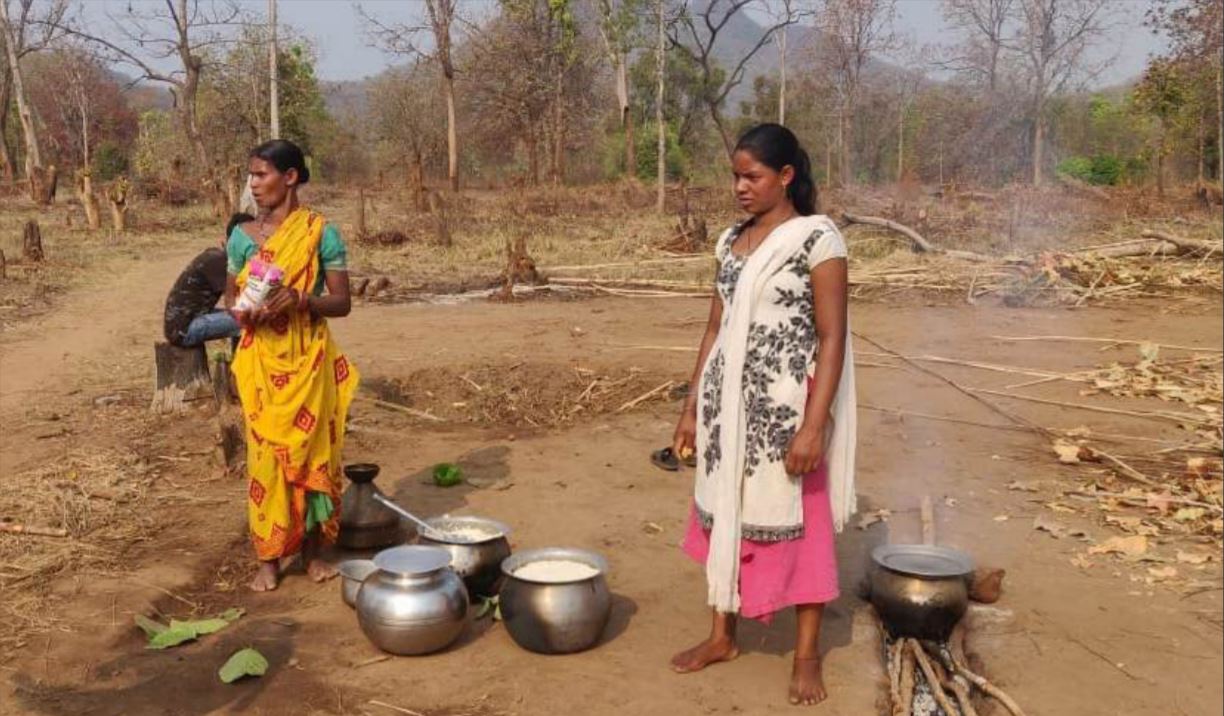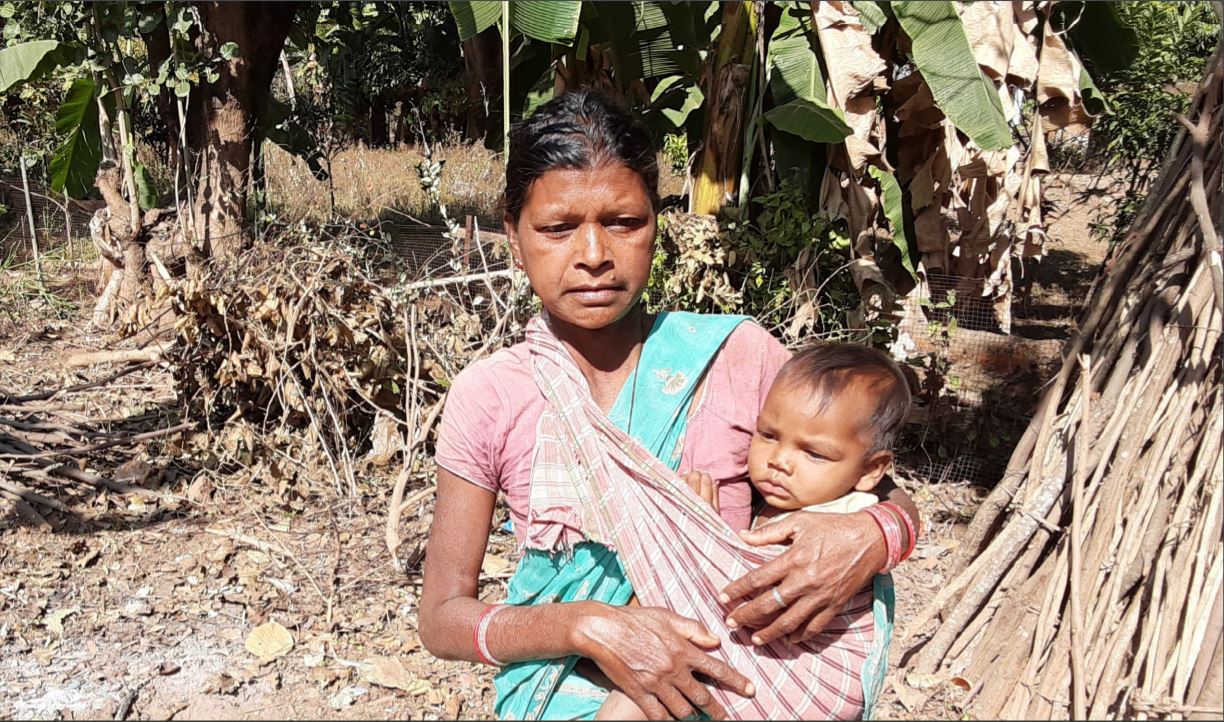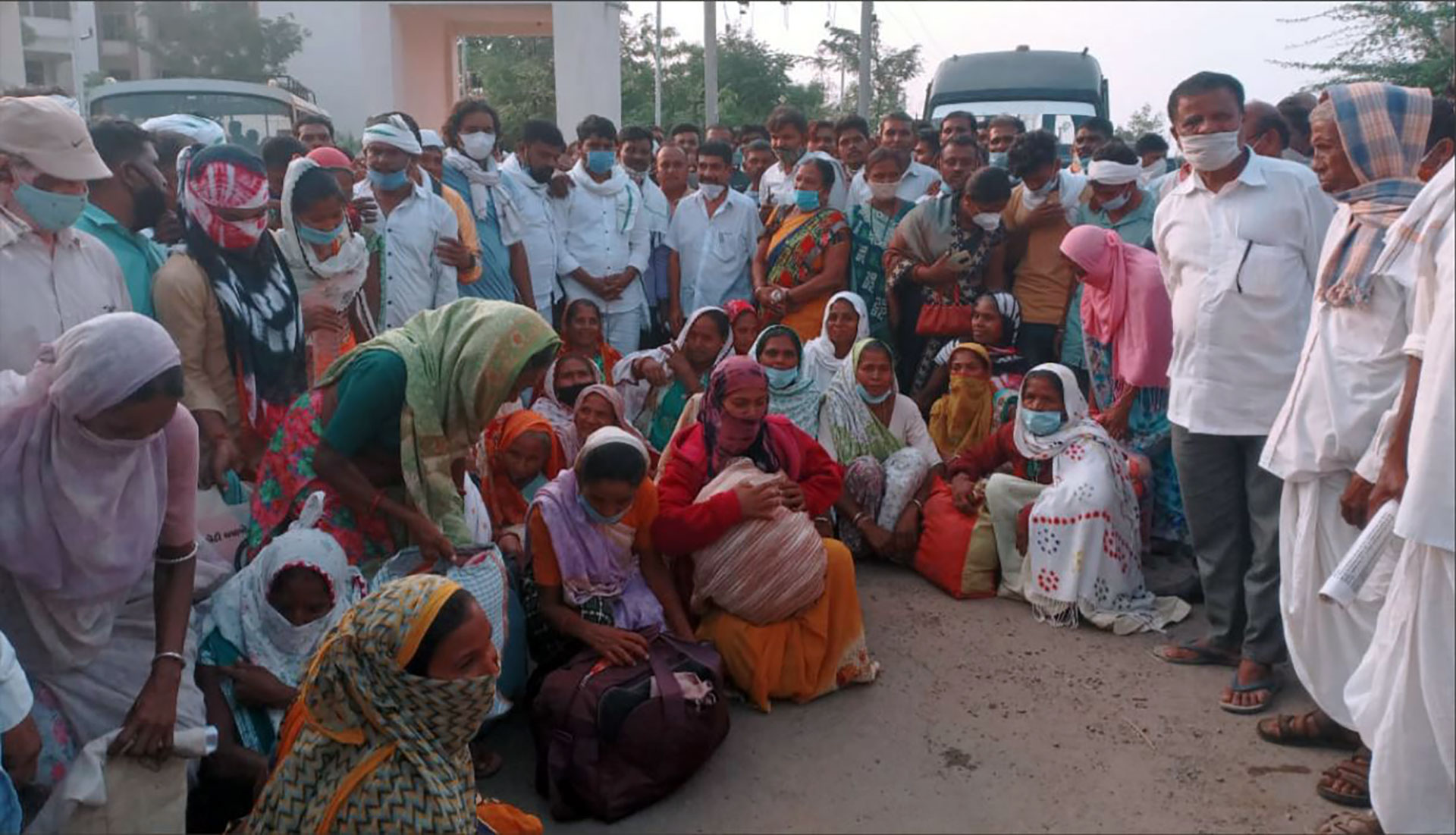Without any prior coordination with the Chief Ministers of State, Prime Minister Narendra Modi declared the nationwide lockdown on March 23, 2020. The immediate shutdown of business industries resulted in about 400 million laborers becoming jobless in one day.1 A huge number of them are Adivasis, a term for Indigenous Peoples in India.* Many of them struggled for survival as lockdown had blocked all their livelihood sources.2
Despite being recognized in the Constitution, the Indian Government has failed to take adequate measures to protect the Adivasis’ rights. Economic liberalization, globalization and privatization have created terrible impacts on the social fabric, economy, politics, culture and idea of community development. The self-dependent community has been compelled to become government dependent. The Adivasis have been alienated from their lands, territory and resources. They are pushed out of the forests to cater to corporate interest resulting in landlessness and impoverishment.
On April 26, 2020, Modi made another proclamation, asking the state governments to relax the lockdown based on ground reality.3This resulted to state governments forcefully evicting the Adivasis from their homes, denying them of their livelihood by displacing them from their agricultural land, and brutally killing, torturing and criminalizing them by falsely implicating a number of them as Naxals, a group of Maoist rebels.4
Then, on June 18, 2020, Modi announced the opening of 41 coal mining blocks for virtual auction to private companies.5 He is hoping that the private investments will create thousands of jobs and turn around India’s current economic slump due to the pandemic. More than half of the locations of the 41 coal blocks are home to Indigenous Peoples and located in biodiversity-rich forest areas.6
“Mining will be our death. It is going to devastate everything nature has given us. One-time compensation for the land is not enough – we need much more than money to survive. We need nature to be with us.” - Villager from Ghatbarra village in Chattisgarh
His decision threatens to breach some of the existing protective and enabling national laws, namely, Scheduled Tribes and Other Traditional Forest Dwellers (Recognition of Forest Rights) Act of 2006, Provisions of the Panchayats (Extension to the Scheduled Areas) Act of 1996, Environment Protection Act of 1986 and Environmental Impact Assessment Notification of 2006 and Right to Fair Compensation and Transparency in Land Acquisition, Rehabilitation and Resettlement (LARR) Act of 2013, among others.
The Adivasis dread the threat of coal mining to their lives and their collective rights to land and territories, cultural integrity and self-determination. Their fear is expressed by a villager from Ghatbarra village in Chattisgarh who said, “Mining will be our death. It is going to devastate everything nature has given us. One-time compensation for the land is not enough – we need much more than money to survive. We need nature to be with us.”7

DEMOLITION OF KONDHS’ HOMES AS ROAD CONSTRUCTION AND MINING ARE PRIORITIZED IN THE MIDST OF THE PANDEMIC8
On April 24, 2020, 32 Kondh Adivasi families of 90 individuals with 35 women and 20 children were rendered homeless when the Bhawanipatna Southern Forest Rangers demolished their village under Sagada Panchayat* in Kalahandi district in the state of Odisha.
The Forest Rangers claim the families only moved there after the lockdown was declared, but the villagers had been living in the area for around six months before the demolition. Activists and advocates heavily criticized the timing of the eviction and said it was a violation of the lockdown measure, not to mention a cowardly and heartless act amid a health crisis. They also said it was a violation of the Scheduled Caste and Scheduled Tribes Prevention of Atrocities Act.
The villagers said they left their homes that day to attend a funeral in a nearby village. Upon returning in the evening, they were shocked to see their houses destroyed and their farm animals gone, leaving them vulnerable to the COVID-19 and suffering from hunger.
The Kondh Adivasi families were originally from Nehela village within the Karlapat Wildlife Sanctuary area of Jugsaipatna Panchayat in Kalahandi district. They had been living there for generations and practiced shifting cultivation for their livelihood. In 2017, heavy rains caused a massive landslide, rendering the villagers almost homeless. Their agricultural land was also washed away and could not be reclaimed. They feared for their lives every monsoon season because torrential rains threatened to wash away their homes as they were living on the edge of a cliff inside the Sanctuary.
In the last two years, they have been writing to the District Collector and District Forest Officer demanding that they be given legal land titles to their homestead and farmlands, but their requests had gone unheeded. After consultation with local villagers, they then decided to rebuild their homes in Sagada village, which is 20 kilometers from their original village.
It is known that an ongoing road construction is linked to the proposed mining site of Khandualmali to the national highway. The road would go through Sagada village where the villagers had constructed their houses. The road construction is further linked to a plan to open the Sanctuary area for bauxite mining.
Karlapat Wildlife Sanctuary has 10 revenue villages and nine unsurveyed villages with a total population of 1,551 as per a 2014 official survey. Guaranteed under Forest Rights Act 2006, converting unsurveyed villages to revenue villages will record the village in government data and enable villagers to benefit from welfare schemes. Besides these 19 villages, there are 44 villages around the Sanctuary with a population of about 8,000. Nehela was one such unsurveyed village and the villagers were entitled to settlement of their forest land and community forest rights under the Scheduled Tribes and Other Traditional Forest Dwellers (Recognition of Forest Rights) Act of 2006. Under the Act, they are also entitled to several resettlement rights, therefore, they cannot be evicted without their legal formal consent and prior notice, and can choose their site of relocation. They are also entitled to cash compensation and provisions of public utilities in the relocated village.
The Kondh Adivasi families have since rebuilt their huts with woods, plastics and leaves in the same place. They have started cultivating the land and collecting forest produces, and they go to the nearby town for daily wage. State aggression still looms, and they will continue to fight for their collective rights to their lands.

CRIMINALIZATION OF THE PATHALGARI MOVEMENT LEADS TO ARREST AND DETENTION
The Pathalgari Movement of the Munda Adivasi community is criminalized for fighting for their collective rights to self-determination and protection of their lands, territories and resources.
Forty-six year old Ladu Nag from the Munda Adivasi community is bound to live alone after her husband Neta Nag, a resident of Kevda village in Khunti district of Jharkhand, was imprisoned in April 2018. The Murhu police filed a case9 against him along with 11 persons including a woman— two from Oraon and nine from Munda Adivasi community— on March 13, 2018. They were accused of mobilizing a big armed crowd without any notice or permission, capturing the police station, and disarming police officers. They allegedly agitated the people at a public meeting, which was organized to erect a stone plaque at the village entrance. This supposedly hindered public works and disturbed the law and order. They were charged with sedition under the Indian Penal Code.
These allegations are related to the Pathalgari Movement, an autonomous resistance of the Adivasi Munda of Khunti district in Jharkhand that aims to reclaim collective rights over their lands, territories and resources.10 “Pathalgari” is a term that refers to an Adivasi custom of erecting stone plaques in honour of their ancestors, to announce important decisions regarding their families and villages, or to simply mark the boundary of their villages. The Pathalgari Movement started on February 9, 2017 in Bhandra village of Khunti district in Jharkhand. It was launched to protest the passing of an ordinance amending the Land Acquisition Act (Jharkhand Amendment) in 2016 and Proper Bills in 2017. These amendments would weaken the two safeguarding land laws made for Adivasis, i.e. Chhotanagpur Land Tenancy Act of 1908 and the Santhal Pargana Tenancy Act of 1949.
Neta Nag had never participated in any activity of the Movement, but he now faces sedition charges and violation of several other sections under the Indian Penal Code.11 If he loses the legal battle, he will face lifetime imprisonment.
Hoping to get her husband released on bail, Ladu mortgaged their patches of farming land and fruit bearing trees. After handing over Rs.100,000 (1,400USD) to the lawyer, Neta still languishes in the Dumka district prison.12 The couple have three sons with two of them also in prison due to an allegation that they are members of a Naxal organization.13
Since her husband’s arrest, Ladu has been struggling to survive. She and her husband used to work as farm laborers. She has not visited him as she has no money to afford the 400-kilometer travel from their village to Dumka district prison. With the imposition of lockdown to address the Covid-19 pandemic, her life became more miserable as she was unable to work following the nine-month lockdown in the region. Even after it was lifted, the pandemic’s economic impacts made it more difficult for her to get any kind of work.
Neta and Ladu Nag’s ordeal is not an isolated case. There have been 10,000 Adivasis from Munda, Oraon and Santhal Adivasis* criminalized by the State in relation to the Pathalgari Movement.14These attacks are aimed at the Adivasi’s right to self-determination. The ruling Bhartiye Janta Party (BJP) has suppressed, terrorized and criminalized the legitimate demands of the Pathalgari Movement. It is one of the recent worst examples of criminalization of the Munda Adivasi community by the Indian government.
The Jharkhand police lodged 30 cases against 11,776 villagers with only 316 of them currently named and the rest are unnamed in three districts of Jharkhand state.15 Of the 30 cases, 20 are sedition charges filed under sections 121A and 124A of the Indian Penal Code.16 They are accused of waging war against the Indian State for establishing their traditional Gram Sabhas (Village Councils) as the Supreme Authority in the villages. The police submitted charge sheets to the Court against 8,190 accused persons17 related to all 30 cases with 115 of them imprisoned and most still languishing in different Jharkhand prisons. Consequently, 207 villagers have absconded in fear of being arrested by the police.
No one has been bailed out even from among those imprisoned since 2017. With the pandemic, there have been no Court hearings in 2020 as part of the measure to address the health crisis resulting in pain and suffering for families whose working members remain in prison.
Read and download the full IPRI's 2021 Annual Criminalization report here.


%2020.49.20.png)
